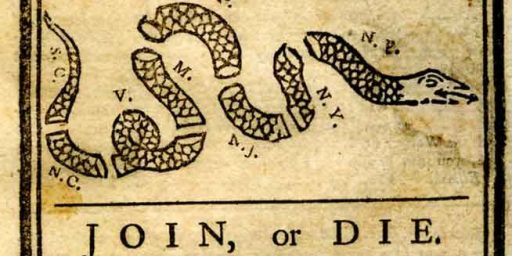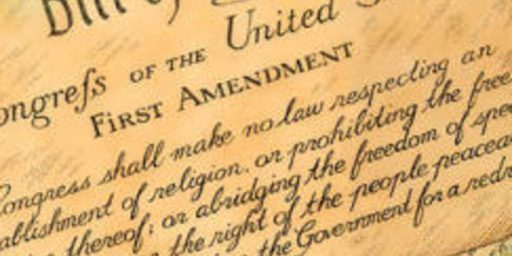Court Rules Teacher Calling Creationism “Superstitious Nonsense” Does Not Violate First Amendment
An interesting decision from the 9th Circuit Court of Appeals last week, in which the Court threw out an Establishment Clause lawsuit against a California School District over a teacher’s classroom comments deriding the arguments that suppose that a Supreme Being must have been behind the origin of the universe:
The dispute began in 2007 when Chad Farnan, then a 15-year-old sophomore in Corbett’s class, took issue with comments about creationism the teacher made during his lectures.
Aristotle … argued, you know, there sort of has to be a God. Of course that’s nonsense,” Corbett said according to a transcript of his lecture. “I mean, that’s what you call deductive reasoning, you know. And you hear it all the time with people who say, ‘Well, if all this stuff that makes up the universe is here, something must have created it.’ Faulty logic. Very faulty logic.”
He continued: “The other possibility is, it’s always been there…. Your call as to which one of those notions is scientific and which one is magic.”
“All I’m saying is that, you know, the people who want to make the argument that God did it, there is as much evidence that God did it as there is that there is a giant spaghetti monster living behind the moon who did it,” the transcript says.
Corbett told his students that “real” scientists try to disprove the theory of evolution. “Contrast that with creationists,” he told his students. “They never try to disprove creationism. They’re all running around trying to prove it. That’s deduction. It’s not science. Scientifically, it’s nonsense.”
It’s worth noting that the class in question here wasn’t a biology class, but an Advanced Placement European History Class that included the following course description as described in the Opinion:
AP Euro is a college-level course for which students can receive college credit if they pass the AP exam administered by the College Board. The AP Euro standards are equivalent to a University of California course. The College Board dictates that AP Euro cover a number of topics touching on religion, including: “[c]hanges in religious thought and institutions,” “[s]ecularization of learning and culture,” “[s]cientific and technological developments and their consequences,” and “[c]hanges in elite and popular culture, such as new attitudes toward religion, the family, work, and ritual.” The College Board’s course description explains that these “cultural, economic, political, and social developments . . .played a fundamental role in shaping the world in which [we] live,” and accordingly provide “context for understanding the development of contemporary institutions, the role of continuity and change in present-day society and politics, and the evolution of current forms of artistic expression and intellectual discourse.”
In his lawsuit seeking to impose civil liability on Corbett and the School District, Farnan contended that Corbett’s dismissive comments toward creationism constituted an “establishment of religion” in violation of the First Amendment. However, as the Court found, there is simply no legal support for the argument he was making:
Nothing in the law would make clear to a reasonable person that he might violate the Establishment Clause by making the challenged statements in the context of a classroom discussion in an Advanced Placement history course. Even as a general matter, precedent on the Establishment Clause is scarce and we “have little guidance concerning what constitutes a primary effect of inhibiting religion.” Am. Family, 277 F.3d at 1122; see also Vasquez v. L.A. Cnty., 487 F.3d 1246, 1256 (9th Cir. 2007) (same). More to the point, we are aware of no prior case holding that a teacher violated the Establishment Clause by appearing critical of religion during class lectures, nor any case with sufficiently similar facts to give a teacher “fair warning” that such conduct was unlawful. Flores, 324 F.3d at 1136-37; see also al-Kidd, 131 S. Ct. at 2084. The only cases that Farnan argued in his briefs clearly establish the law in the relevant educational context involve claims that school officials were promoting religion rather -than expressing hostility toward it, and challenge systemic actions such as state laws and school district policies rather than parsing individual teachers’ classroom discussions.
Moreover, the Court held, the broader interest in encouraging academic discussion and debate trumps whatever offense Farnan may have suffered in hearing his beliefs challenged:
The Supreme Court has long recognized the importance of protecting the “robust exchange of ideas” in education, “which discovers truth ‘out of a multitude of tongues.’ ” Keyishian v. Bd. of Regents, 385 U.S. 589, 603 (1967) (quoting United States v. Associated Press, D.C., 52 F. Supp. 362, 372 (S.D.N.Y. 1943)). “Teachers and students must always remain free to inquire, to study and to evaluate, to gain new maturity and understanding . . . .” Id. (quoting Sweezy v. New Hampshire, 354 U.S. 234, 250 (1957)) (internal quotation marks omitted); see also Nat’l Sch. Bds. Ass’n, School Board Policies on Academic Freedom 2, 5 (1973) (“Academic freedom is an essential for responsible teachers. . . . To prepare students for adult roles in a democratic society, teachers and the schools must try to maintain an atmosphere of free inquiry.”). This academic freedom will sometimes lead to the examination of controversial issues. Both parties agree that AP Euro could not be taught without discussing religion. We have no doubt that the freedom to have a frank discussion about the role of religion in history is an integral part of any advanced history course. Indeed, a collective of organizations including the American Association of School Administrators, American Federation of Teachers, National Education Association and National School Boards Association, has long acknowledged that “[b]ecause religion plays a significant role in history and society, study about religion is essential to understanding both the nation and the world.” Religion in the Public School Curriculum: Questions and Answers, 8 J.L. & Religion 309, 310 (1990); see also Tenn. Educ. Ass’n, A Teacher’s Guide to Religion in the Public Schools 2 (2008) (same).
(…)
In broaching controversial issues like religion, teachers must be sensitive to students’ personal beliefs and take care not to abuse their positions of authority. See Edwards, 482 U.S. at 584 (“Families entrust public schools with the education of their children, but condition their trust on the understanding that the classroom will not purposely be used to advance religious views that may conflict with the private beliefs of the student and his or her family.”). But teachers must also be given leeway to challenge students to foster critical thinking skills and develop their analytical abilities. This balance is hard to achieve, and we must be careful not to curb intellectual freedom by imposing dogmatic restrictions that chill teachers from adopting the pedagogical methods they believe are most effective.
In other words, the fact that something that’s said in a classroom challenges your beliefs doesn’t mean you have a right not to hear it.







Calling superstitious nonsense superstitious nonsense is not unconstitutional. Who’da thunk it?
Three cheers for the Ninth Circuit!
I can’t believe somebody sued Corbett over those statements. Just goes to show that there’s a lawyer for every cause, even the stupid ones. The statements don’t even strike me as anti-religious, per se. Corbett asserted that there’s no scientific proof for Creationism. Is there some that I don’t know about?
While I heartily agree with the ruling, I’m bracing for a deluge of faux outrage from the Usual Suspects about how this is another sign of impending Sharia Law or some such thing…
A great victory for Mataconis! It’s about time that open ridicule of Christian, Muslim, and Jewish religious beliefs got the official sanction of the legal system.
When will those anti-science, backwards, half-witted religious nuts ever learn that their inherent delusions make then unfit for any responsible position in society…?
She could also say that Islam is Superstitious Nonsense, or Atheists are immoral. The personal views of teachers are not tantamount to a government-sanctioned establishment of religion.
She could also be fired for saying things that deviate from the school-sanctioned curriculum or create unhelpful distractions, but she wasn’t.
The Court’s opinion was more than gratifying, it was a victory for free thought and academic freedom. The 9th Circuit affirmed that in America, no religion has a right to demand that teachers defer to their beliefs. If that were true, teaching would become a Constitutional minefield. The Court held that “teachers must be given leeway to challenge students to foster critical thinking skills and develop their analytical abilities.” Chad’s lawyers argued that questioning “Creation Science” violated the First Amendment, but American law gives no special place to any religion. One person’s religion is another person’s superstition. To Jews, Muslims, Hindus and dozens of other religions, the New Testament is “Christian Superstition,” just as their views are superstition to Christians. When I referred to a religious belief as “superstition,” I sought to show respect for all by favoring none. My classes have Jews, Hindus, Bahai, Muslims, Buddhists, and others. Chad would demand a special place for his views, but in America, all beliefs should be treated equally by government.
The one thing that bothers me most about this case is that neither Chad nor his parents nor the so-called Advocates for Faith and Freedom, ever made an effort to talk with me before filing the suit. In my view, they were all more interested in gaining publicity for themselves, and donations for the Advocates, than in protecting Chad’s rights. They cost our schools hundreds of thousands of dollars when the whole thing could have been settled with a phone call that they never made.
Finally, here are two stanzas from Robert Service Poem (Reagan’s favorite poet) that have been with me for 50 years–since my father read it to me when I was a teenager:
“Carry On”
And so in the strife of the battle of life
It’s easy to fight when you’re winning;
It’s easy to slave, and starve and be brave,
When the dawn of success is beginning.
But the man who can meet despair and defeat
With a cheer, there’s the man of God’s choosing;
The man who can fight to Heaven’s own height
Is the man who can fight when he’s losing.
Jim Corbett
Having grown up in a conservative, even fundamentalist home, I’d say the kid got a damn fine educational experience regarding modern western philosophical and scientific thinking. Similar to the one that I got at a slightly older age. I hope Mr Corbett counter-sues for harassment and collects a bunch from the spoiled snot’s parents.
When the Bible was removed from the schools, they went downhill.
@Gulliver:
I don’t know, I keep waiting.
Stupid lawsuit.
I hope this is applicable to the idiots who get their panties in a wad because some kid wants to thank God in a valedictorian speech or the ones who get bunged up because some some memorial has a tile with a cross on it.
I am an agnostic but the hateful and degrading comments toward religious people on here is pretty disgusting. Sounds like many are suggesting a “religious test” for people in this case, one that tells you what you cannot believe to be considered a normal member of society. Talk about narrow minded.
Has there been a prior appellate court decision in which ‘Flying Spaghetti Monster’ can be found?
@kevinbsnyder: I think maybe some of the people you’re angry at are joking.
@Gulliver: “It’s about time that open ridicule of Christian, Muslim, and Jewish religious beliefs got the official sanction of the legal system.”
Open ridicule of anything got the official sanction of the legal system when the First Amendment was ratified.
@Jay: W@Franklin: The First Amendment applies only to things Gulliver doesn’t like. For everything else you’d better shut up or get some Jeebus smacked into you.
Just homeschool this kid already….Sheesh.
I wonder how this would have been received in a slightly different context. This was, for all intents and purposes, a college class. As such, it’s completely voluntary and a state institution only in the sense that it’s subsidized by tax dollars. No one in the history of mankind has ever thought words coming out of a college professor’s mouth were state policy.
What if this were an ordinary, required high school science course? A junior high science course? An elementary school science course? At some point, there’s a reasonable argument that the teacher’s words–with which I completely agree–are tantamount to the state taking a position on religion.
In such cases, it would probably be better to simply describe the scientific method to explain why evolution remains the prevalent scientific theory–laying out the evidence and methods, the theory of falsification, etc.–and noting that the religious theory of creationism is not supported by evidence but nor is it falsifiable. Essentially, that faith and science operate by different rules but aren’t necessarily incompatible.
@James Joyner: You’re right. An AP class carries with it a degree of academic freedom that a regular high school class most likely would not. A regular high school classroom teacher is very much a state agent. The court found wiggle room with the fact that this was an AP course, essentially a university course.
Actually, accurate belief in God is quite scientific.
Though the Bible is not a science textbook, when it touches on matters of science it is highly accurate. For example…
1) The Bible said the earth was round long before the “modern science” of the day acknowledged this: Isaiah 40:22 . . .”There is One who is dwelling above the circle of the earth”.
2) Laws on physical hygiene given to Israelites were highly advanced, and helped prevent disease long before “modern science” found that microscopic organisms were a major cause of disease:
* Command to bury human waste: Deuteronomy 23:13 (still not followed in many third world countries, where disease is rampant).
* Not touch dead bodies: Numbers 6:6.
* Quarantine those with disease: Leviticus 13:1-59.
3) The Bible’s account of the origin of the universe fits many scientific views of its origin:
“Now we see how the astronomical evidence leads to a biblical view of the origin of the world. The details differ, but the essential elements in the astronomical and biblical accounts of Genesis are the same: the chain of events leading to man commenced suddenly and sharply at a definite moment in time, in a flash of light and energy.” — Astronomer Robert Jastrow, God and the Astronomers (New York, 1978), p. 14.
Just a few of many, many examples.
@James Corbett:
Congratulations on your f9th circuit court victory.
I am surprised however that the legal case went as far as it did. Chad should have been thrown out by the first judge in the first courtroom he appeared in.
@Al Anon:
Geez, it’s hard to believe Newton, Einstein, Pascal, and all the other great scientists wasted their time discovering scientific laws when they could’ve just opened up the Bible. I heard Jesus was brilliant at inorganic chemistry.
@Al Anon: First, a “circle” is not a sphere and the Bible also says that Jerusalem is at the center of the world.
There are quite reasonable causes for the dietary rules including the fact that pigs and humans compete for the same food and at certain times of the year and under certain conditions shell fish are dangerous to eat.
Burying waste also has an obvious evolutionary purpose. Why didn’t God tell those who don’t?
Quarantine, again an obvious evolutionary purpose and corpses are often disease ridden.
But the real problem, for a scientist, is that the notion of a creator is not a testable hypothesis and, of course, there is the issue of infinite regression. When, exactly was God born? If you say he (she?) exists outside of time, how do you know? Faith, right? I have no problem with faith and I promise not to bring my reason into your church if you promise not to bring your faith into my school.
I actually agree with that in a poetic sense, but I’d never confuse this beautiful, and to me, deeply moving piece of poetry for science, nor should anyone else:
I don’t think that can improved on as an attempt by a prescientific society to make sense of the world. But as beautiful and moving as I find those lines, they do not come close to capturing the wondrous and terrible grandeur of the creation story as told by modern cosmologists. If there is a God behind the creation of this world, best to do what Wittgenstein once admonished: to pass over in silence about that of which we cannot speak.